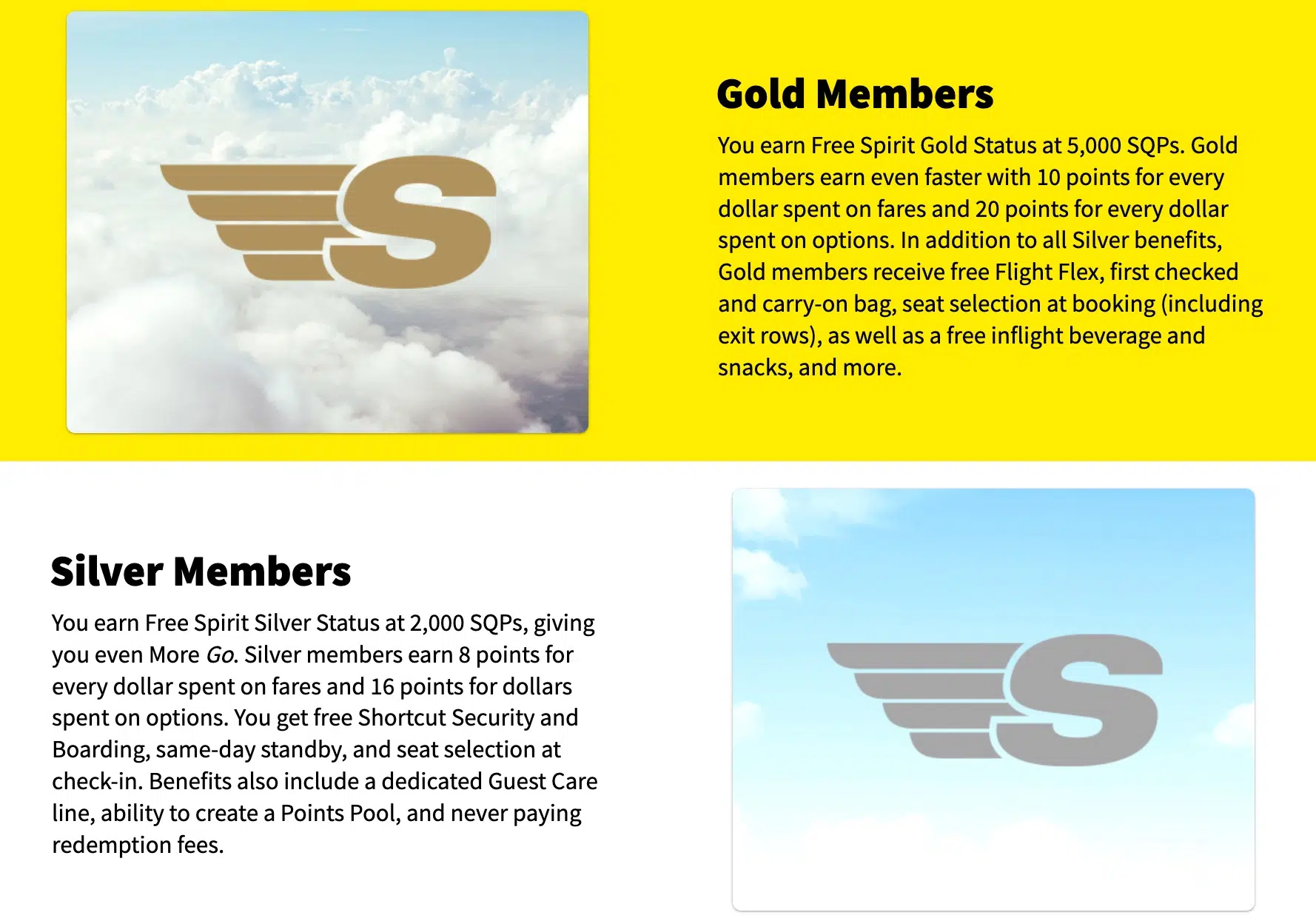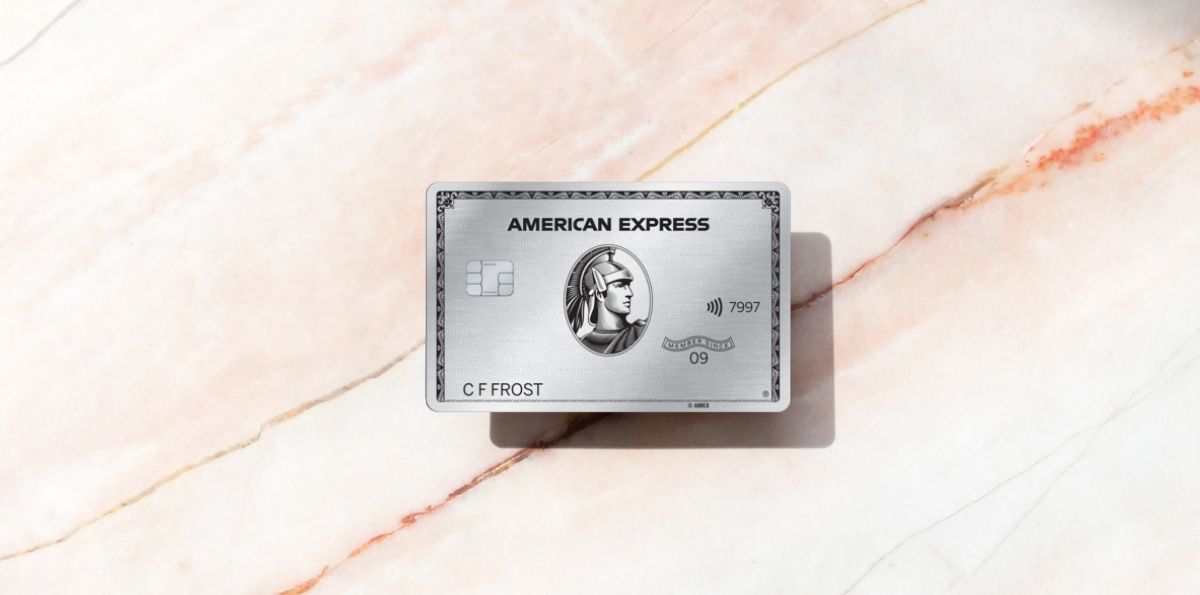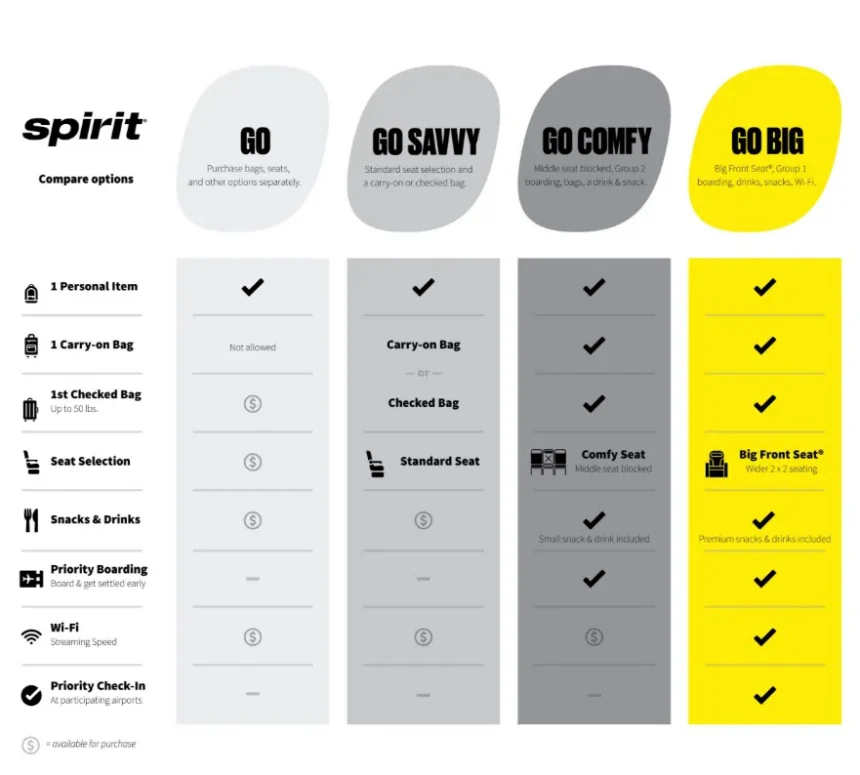Moreso than perhaps any other budget airline, Spirit Airlines has a reputation for tight legroom and charging extra fees for … well, pretty much everything in exchange for a cheaper fare upfront. That’s changing as the airline has moved away from that a la carte pricing model by selling bundled fares instead.
One thing isn’t changing, though: Baggage fees still add up fast flying with Spirit
Fortunately, the days of unpredictable fees that vary wildly from flight to flight are over. Depending on what kind of fare you buy at the start, checking a bag with Spirit will now cost you another $50 each way – or even more if you need to check a second or third bag. And a carry on could cost you another $50, too … if you’re able to bring a carry-on bag onboard at all: Spirit’s cheapest fares don’t allow them, period.
Understanding these baggage fees is the key to getting the most out of Spirit, ensuring you’re still coming out ahead on that seemingly cheap ticket. So we’ve put together this guide to help you understand what you will pay for your luggage on your next Spirit flight.
Here’s what you should know before you book.
What You Get with Spirit’s New Fare Bundles
For years, Spirit charged a flat (and low) price for flights in exchange for higher fees for … well, absolutely everything else. Picking a seat, bringing a carry on, checking a bag, and even buying water onboard would cost you extra.
Those days are over. As Spirit and other budget airlines struggled post-pandemic, the airline replaced that a la carte pricing system with four different bundles: Some of which include carry-on bags, checked bags, and seat assignments that the airline previously charged separately.

- The cheapest Go fares look much like Spirit’s previous tickets: checked bags, seat selection, snacks, and drinks will all cost you more. And bringing a carry-on bag simply isn’t allowed – not even for an extra fee.
- Go Savvy fares include the choice between either one checked or carry-on bag, plus a standard seat selection for free.
- Go Comfy is something new altogether: A space with a guaranteed blocked middle seat at your side to stretch out. Plus, a carry-on bag, checked bag, priority boarding, and a snack and a non-alcoholic drink.
- Go Big fares get you in Spirit’s wildly popular Big Front Seat … with much more included: A carry-on bag, a checked bag, priority check-in and boarding, free snacks and alcoholic drinks, and complimentary Wi-Fi at streaming speeds.
But you’re still paying for it: The more you get with each bundle, the more Spirit charges.
Exactly how much more varies from route to route. For example, the cheapest “Go” fare from Fort Lauderdale (FLL) to Las Vegas (LAS) costs just $71 each way. But for a “Go Savvy” fare that includes either a carry on or a checked bag, the cost jumps by $60 to $131 total. Double that for a roundtrip: It’d cost an extra $120 total for that fare that includes some baggage and a standard seat assignment.

On the cheaper and shorter flight from Minneapolis-St. Paul (MSP) to Detroit (DTW), the jump from the cheapest fare to one that includes baggage is just $40 each way – or $80 roundtrip.

The difference in price between bundles varies widely from route to route and time of year. But you can expect to pay an extra $30 to $80 or so each way to bump up from Spirit’s cheapest, stingiest fare bundle.
And if you want to bring a carry-on bag, that’s absolutely essential.
Spirit’s Carry-On Policy & Fees
Unlike the major legacy airlines like Alaska, American, Delta, and even Frontier, you don’t get a free carry-on bag when you book Spirit’s cheapest tickets.
The cheapest “Go” bundle from Spirit doesn’t allow you to bring a carry-on bag, period – not even for an extra fee.
With the cheapest Spirit fare bundles, all you get for free is a personal item – think of a purse or a backpack. Dimensions must be smaller than 18 x 14 x 8 inches (45 x 35 x 20 cm) and must fit underneath the seat in front of you.
The one exception is if you really fly Spirit a lot, you can bring a carry-on bag onboard for free with Spirit Gold Status. But that’s it.
Otherwise, you’ll need to pay for at least a “Go Savvy” bundle which includes either a carry-on bag or one piece of checked luggage. If you buy a “Go Savvy” fare and pick a checked bag only to decide you also want to bring a carry-on bag onboard, too, you can add it to your ticket for a flat $50 fee each way.

Other, pricier fare bundles like the “Go Comfy” or “Go Big” fares include both a carry-on bag and a checked bag.
If you don’t pay for a carry-on bag, your boarding pass will show you’re not allowed to bring one onboard. Trust us: Don’t try to sneak one on.
Carry-On Size Requirements
Carry-ons must not exceed 22 x 18 x 10 inches – including handles and wheels – and must be able to fit into the overhead bin. Spirit often requires you to check your bag at the gate if it’s too large, which could be pricey.
That policy mirrors other major airlines, meaning most regular carry-on bags will likely fit Spirit’s size requirements.
Checked Baggage Fees
How much is a checked bag on Spirit? It depends on what kind of ticket you booked.
With the cheapest “Go” fare bundle, adding a first checked bag to your ticket now appears to cost a flat, $50 fee each way. That means you’ll wind up paying $100 more roundtrip.

If you’ve worked your way up to Spirit Gold Status, you can always get that first checked bag free. Meanwhile, the pricier “Go Savvy” bundles give you the option to check a bag or bring a carry-on bag for free. Other, more expensive fare bundles always include both in the price.
But the cost increases the more bags you check.
- A second checked bag costs $75 each way
- A third, fourth, and fifth checked bag will cost $99 apiece each way
Checked Bag Size & Weight Requirements?
For years, Spirit was incredibly restrictive with how much checked baggage could weigh, setting the limit at just 40 pounds.
Fortunately, that has changed. Spirit now allows checked bags to weigh up to 50 pounds. After that, overweight baggage fees will start to kick in – more on those shortly.
As for the size of your bag, Spirit follows the rest of the airline industry: Checked bags can be up to 62 linear inches. Just add the total height, width, and depth of your bag to check. Most checked bags fit this requirement.
You’ll want to triple check your bag isn’t oversize or overweight, otherwise some hefty additional fees will kick in.
Overweight & Oversize Baggage Fees
If your bag clocks in just 1 pound too heavy at 51 pounds at the check-in counter, you’ll be forced to pay a $125 fee … on top of what you paid for your fare or separately to add a checked bag.
The only way to avoid these extra fees is by having Spirit status. But weight isn’t the only factor to consider when packing up for your Spirit flight – size matters, too.
If it’s more than 62 inches, it’s considered oversized baggage and will be subject to a $150 fee on top of your checked bag fee. And if your bag is more than 80 linear inches, it won’t be accepted, period – unless it’s a considered special item, in which case it will also incur an extra $150 fee.
Get out that tape measurer before you head to the airport if you’re flying Spirit. You don’t want to get stuck with these extra fees!
Checking Sports Equipment
Like many airlines, some popular sports equipment items can be checked as regular baggage with Spirit, while others require special fees.
| Sporting Equipment Type | Baggage Fees |
|---|---|
| Bicycle | $75 |
| Surf Board (Maximum of 2 surfboards in one bag) | $100 |
| Golf Clubs | Same as checked bags (overweight charges may apply) |
| Skis/Snowboards | Same as checked bags (overweight charges may apply) |
Some other, more unusual pieces of sporting equipment and other obscure baggage types are outlined on Spirit’s Contract of Carriage.
Tips to Save on Bag Fees with Spirit
Fortunately, there are a few different ways you can save on bag fees when you fly Spirit.
Some are as simple as buying a bundle that includes the baggage you need rather than trying to add it separately. Others require a little more creativity – or maybe carrying the right credit card.
And active duty military personnel do not have to worry at all: They all receive a free carry-on and two free checked bags when they show their military ID.
Buy a Bundle that Includes Bags
It’s this simple: If you want to check a bag, you’re probably better off buying at least a “Go Savvy” bundle when you book your Spirit flight.
While these fares are pricier than the cheapest Spirit ticket, they include the choice between a checked bag or a carry-on bag (as well as other perks like complimentary seat selection). And the cost of that bundle is often lower than the bag itself.
Here’s an example. You could book the cheapest, $59 one-way ticket from Fort Lauderdale (FLL) to Boston (BOS), then pay $50 to add a bag later on …

But you could buy a “Go Savvy” bundle that includes a checked bag (or a carry on – your choice) for just $40 more instead. That’s clearly the better choice here.

You’ll need to do the math to ensure you come out ahead buying a bundle versus adding a checked bag separately. But considering you’ll also get complimentary seat selection, it’s often the far better deal.
Join Spirit Airlines Saver$ Club
For approximately $70 a year, you can join the Spirit Saver$ Club and shave a few bucks off every time you need to pay for a bag. But those savings don’t go nearly as far as they did a year ago.
For years, you could save $7 or more on all luggage fees with a Saver$ Club membership. No more: Now, that subscription saves you just $1 a bag, no matter what kind of bag you’re bringing or when you pay.
Earn Spirit Status
Back when Spirit overhauled its loyalty program a few years ago, it also introduced a bonafide status program.
There are two tiers: Spirit Silver and Spirit Gold. Earning either level of status requires spending a good chunk of change on Spirit flights each year or spending on a Spirit-branded credit card. But both status tiers unlock some savings on baggage.
- Spirit Silver members don’t pay overweight baggage fees
- Spirit Gold flyers can bring a free carry-on bag onboard and get their first checked bag free, too.

Use Travel Credits or Miles from Your Credit Card
Some top travel credit cards come with annual credits that will cover travel expenses when you use your card. Just how they work varies from card to card, but Chase and American Express could help you cover the cost of your baggage fees.
*amex platinum* offers each cardholder a $200 airline fee credit that can be used on one domestic U.S. airline of your choice. So, if you plan to fly Spirit a few times this year and want those charges covered, you simply choose Spirit Airlines as your preferred airline, and any fees that show up on your statement from Spirit will be reimbursed up to $200.

Read more on how Amex Airline credits work and how to maximize them this year!
The *chase sapphire reserve* card also offers a credit for travelers, but without any strings attached. No matter what the travel expense, Chase will reimburse Sapphire Reserve cardholders up to $300 on their statements. Just pay for your bag fees on your Reserve card and it should kick in automatically.
Over at Capital One, both the *capital one venture card* and *venture x* offer a novel way to cover almost any travel expense using Venture Miles – and yes, that includes these bag fees.
Just pay for them with your card, then go back and erase the purchase from your statement using miles. Every mile is worth 1 cent, so a $50 checked bag would cost you 5,000 Venture Miles.
Bottom Line
Understanding baggage fees is a crucial part of getting value out of your seemingly cheap Spirit flight.
The low-cost carrier has been known for charging fees for nearly everything separately, but that’s changing as the airline pivots to selling bundled fares instead. Still, these baggage fees can add up quick. And with Spirit and other airlines like it, those extra fees can be the difference between a good deal and a bad one.






